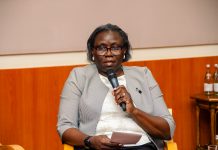By Dickens Okinyi
Artificial Intelligence (AI) is rapidly reshaping the world, from transforming industries to redefining how societies think about work, governance, and creativity. However, as the race intensifies, African experts are calling for a more inclusive and ethically grounded approach that empowers local innovators rather than leaves the continent as a passive consumer of imported technologies.
During a high-level discussion convened by the African Union Development Agency (AUDA-NEPAD) and Research ICT Africa (RIA), experts explored Africa’s readiness to navigate the opportunities and risks posed by the AI revolution. The event drew participants from academia, technology startups, and policy circles across the continent, all eager to understand how Africa can leverage AI for social good.
“Artificial Intelligence will not wait for us to be ready,” remarked Dr. Fortunate Muyambi, Deputy Executive Secretary (Head of Programs and Projects) East African Science & Technology Commission. “It’s already shaping how our data is used, how we are profiled, and how decisions are made about us. The question is whether Africa will remain on the sidelines or design its own future within this new intelligence economy.”
Dr. Muyambi emphasized that while AI offers immense promise, from improving healthcare systems to enhancing agricultural productivity, the ethical and social dimensions cannot be ignored. He urged African governments to move beyond enthusiasm and develop responsible AI frameworks that safeguard citizens’ rights while fostering innovation.
“We cannot afford to copy-paste Western AI policies,” Dr. Muyambi said. “Our data realities are different, our challenges are unique, and our communities require solutions built on trust, transparency, and cultural relevance.”
His sentiments were echoed by Dr. William Wasswa, a biomedical engineer and innovator known for his work integrating AI into healthcare diagnostics. He highlighted how AI is already revolutionizing medical research and patient care, but cautioned that unequal access to data and infrastructure could deepen existing inequalities if not addressed.
“When AI systems are trained primarily on Western datasets, they tend to misrepresent African realities,” Dr. Wasswa explained. “For example, medical AI tools built on data from Europe or the U.S. may not accurately diagnose African patients. That’s why we need to invest in African data for African problems.”
He described his own experience developing an AI-driven tool for early detection of cervical cancer — a project that demonstrated how homegrown innovation can save lives when guided by local research and community involvement.
“The potential is enormous,” he noted. “But it’s not just about algorithms. It’s about people — the doctors, patients, and communities who will live with the outcomes of these technologies.”
Adding a policy and legal perspective, Pria Chetty, Executive Director, RIA, called for stronger data protection and AI governance laws that reflect Africa’s social and economic realities.
“AI must be accountable,” she stressed. “The continent has already seen the effects of unregulated technology, from data breaches to misinformation. We must ensure that innovation doesn’t come at the expense of human rights.”
Chetty advocated for collaboration between governments, academia, and the private sector to establish Africa-led standards for responsible AI development. “We don’t need to reinvent the wheel,” she said, “but we must ensure that the wheel rolls in our direction.”





